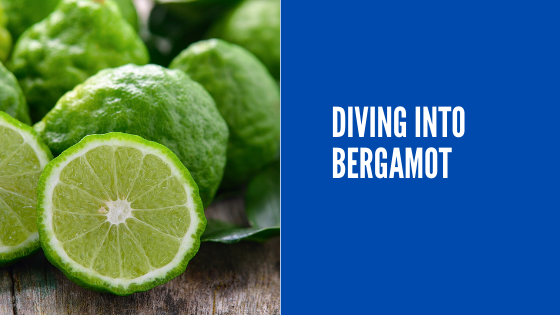With the warmer weather arriving, it can be helpful to think about citrus oils in the sun. One oil which can be an issue is Bergamot. The  Latin name of Bergamot is Citrus bergamia, and like all other citrus oils it is part of the Rutaceae family. Unlike many of the citrus fruits though, the bergamot fruit is not edible because the pulp is so sour. It is produced for essential oils and is also used as a flavouring for Earl Grey tea.
Latin name of Bergamot is Citrus bergamia, and like all other citrus oils it is part of the Rutaceae family. Unlike many of the citrus fruits though, the bergamot fruit is not edible because the pulp is so sour. It is produced for essential oils and is also used as a flavouring for Earl Grey tea.
Bergamot is a great choice if someone has skin conditions such as psoriasis. It can help with stomach issues such as indigestion, loss of appetite or flatulence. It is also good for emotional issues, and can be a good choice for people who are tense, anxious or depressed. Like many other essential oils it is great to use in topical application or via inhalation.
But there’s a problem…
While Bergamot has lots of benefits, it does have a particular problem. It contains a particular chemical called Bergapten, which is also found in a high quantity in Lime. Bergapten is found in much lower quantities in bitter orange, expressed lemon, grapefruit and mandarin, where it tends to be less of an issue.
Bergapten is part of a chemical family called furanocoumarin and it has a particular property, called phototoxicity.
What is phototoxicity?
Phototoxicity means it reacts with sunlight. Using a higher dilution of Bergamot in a topical application and then going into the sun can cause burning. Most extreme cases of burning have been recorded as occurring when people have put Bergamot on their skin undiluted and then gone into the sun. One person showered after the Bergamot being applied, but was still burned when exposed to the sun.
How to prevent an issue
In true aromatherapy style, it’s not a clear-cut picture. As in the case of many essential oil considerations, it can be a benefit versus risk decision.
If Bergamot is considered the best oil of choice, then it should be chosen. When the dilution is high, it is recommended to avoid direct sunlight exposure on the area for 12 hours after it has been used. There are guidelines about the safe level of exposure to Bergamot, so a minimal amount will reduce the risk. Personally, if it’s a really sunny day, I tend to avoid choosing the oil for a general massage, as there is usually an alternative I can choose instead.
direct sunlight exposure on the area for 12 hours after it has been used. There are guidelines about the safe level of exposure to Bergamot, so a minimal amount will reduce the risk. Personally, if it’s a really sunny day, I tend to avoid choosing the oil for a general massage, as there is usually an alternative I can choose instead.
An alternative option is to consider using Bergamot FCF. This is an essential oil which is furanocoumarin free (FCF). This means the Bergapten has been extracted to a trace level to reduce the risk. So, if you’re visiting an aromatherapist for a massage, it’s a sunny day and they’re using Bergamot, you may find they’re using this version.
Bergamot is a great oil, but as the other essential oils, it is is important to treat it with respect. Most essential oils have their own cautions and we should recognise their potential for causing problems if used incorrectly.

Louise is an holistic therapist who owns Therapy Centre, BS14 9HB, a clinic offering a range of holistic and beauty therapies. Louise offers aromatherapy, reflexology, holistic massage, baby massage, reiki and clinical aromatherapy. She is a mum of two boys and when she is not working she enjoys getting outdoors with her family. For further information, visit her website louise-morgan.co.uk

